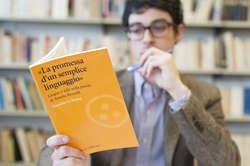 Whether you’re a new or an existing student, why not learn a language in the new academic year? The Library holds a variety of resources to help you learn languages, no matter what your level or preferred mode of study may be.
Whether you’re a new or an existing student, why not learn a language in the new academic year? The Library holds a variety of resources to help you learn languages, no matter what your level or preferred mode of study may be.
Choose your language
The Library’s language learning resources cover the six languages taught to degree level: French, German, Italian, Spanish, Latin and Ancient Greek; and the additional languages taught within the Institution-Wide Language Programme (IWLP): Modern Greek, Russian, Arabic, Mandarin Chinese, Japanese and British Sign Language. Some textbooks or dictionaries for learning other languages, including English as a foreign language, are also in stock.
Choose how to study
If you want to learn a language by yourself, there are various resources for self-instruction, such as workbooks, CDs, CD-ROMs and DVDs.
If you are attending language classes, such as with the IWLP, then there are textbooks, grammars, dictionaries and easy readers which may be a helpful supplement to your course textbook.
 Beyond the language
Beyond the language
Of course, learning a new language also involves finding out about a different country, its society and culture. The Library holds numerous books encompassing the history of many different countries, as well as French, German, Italian and Spanish literature in the original language.
If reading the history and literature of a particular country is a bit too much like hard work, then why not watch a film from that country or study a map of that country? The Library holds many films on DVD, with a large number in languages other than English, as well as a collection of around 70,000 maps and atlases.
Where in the Library?
The language learning resources in the Library are located on the 3rd Floor. Look for Call Numbers in the 400s – in both the ‘Books’ and ‘Large’ sections. Also on the 3rd Floor are films on DVD, at Call Number 791.437, and you may find some language learning resources in the Teaching Practice Collection. Although primarily aimed at trainee teachers, this collection includes children’s literature in English, which may be used to improve English language skills.
For literature, history and field maps, head to the 2nd Floor – literature is located in the 800s, books on the history of various countries are located in the 900s and field maps in the Maps section.
Other language learning resources in the University
The Self-Access Centre for Language Learning (SACLL), located in Edith Morley 230, is a specialist language learning facility, open to international students and the wider University community. The centre includes a wide range of materials for students learning English and foreign languages, including books and DVDs. There are also computers available for students to use, some with useful online language materials.
This is one of a series of tips to help save you time and effort finding or using information
This tip was written by Charlie Carpenter, Liaison Librarian for the International Study and Language Institute.



